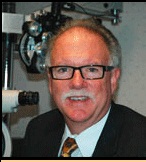By Charles Aldridge, OD

SYNOPSIS
The surgeons to whom you refer patients must be chosen well, and their outcomes must be monitored over time. Your patients’ eye health and your reputation are at stake.
ACTION POINTS
LOOK FOR QUALITY & CONSISTENCY. Check how many surgeries the doctor has done and the outcomes, and speak to other ODs who refer to them.
REFER, DON’T DICTATE. Ultimately, the patient decides if they adhere to your referral.
INVITE SURGEON IN-HOUSE. Invite the surgeon to see patients within your office once a week.
When you refer patients who are in need of surgery, for cataracts, LASIK or for another eye condition, you are presented with an opportunity. You can choose a surgeon whom you have confidence in, and one who will send the patient back to your office for ongoing comprehensive eyecare. I have developed relationships with surgeons in my community that resulted in satisfied patients with good surgical outcomes and the retention of my patients.
Co-managing optometrists typically receive 20 percent of the global surgery fee of cataract surgery, but more significantly, co-managing post-operative care sends an important message to the patient: that you are an integral part of the team caring for their eyes. The post-op period is 90 days for cataract surgery. Thus, the dollar amount of post-op care is divided by 90 to get a per-day reimbursement by the number of days co-management is performed. Post-op cataract care payment is the (surgical fee X 20%) X (days covered by OD/total post-op days).
Look for Quality and Consistency
Before referring patients to a surgeon, check the doctor’s track record through a series of steps. First, ask the surgeon directly about the number of cataract, LASIK or other surgeries he or she has done and about the outcomes. Be mindful that even though you are not doing the surgery yourself, the results are attributable to you since you are the one who referred the patient to the surgeon.
Good reputation among my optometric colleagues is the characteristic of surgeons that I most value. These other optometrists have worked with the surgeon personally and have witnessed their surgical outcomes–good and bad. Additionally, they can attest to how well they work with optometrists.
In addition to speaking with the doctor him or herself, it is good to speak with patients who have been happy with the surgeon’s work. A key person to speak with is a patient who only needed cataract surgery in one eye, but not the other. Ask that patient whether they plan to go back to the surgeon for the second eye.
Having a friendly, respectful relationship with the surgeon is important, but a great relationship never trumps the ability to provide good, quality surgery.
Establish Long-Term Relationships
There are three surgeons in my community that I have been working with for years: a retinal surgeon I have been working with for 22 years; a cataract surgeon I have been referring to for 15 years and a refractive surgeon I have been referring to for at least 10 years. Then there are an additional few surgeons, such as a surgeon with a specialty in glaucoma, whom I refer to occasionally.
I have stuck with them over the years because they have shown me that good patient care is paramount. They respect me and my profession. They always speak highly of me to the patient, and they keep me updated as to the patient’s status
Refer, Don’t Dictate
You may trust the handful of surgeons you refer to, but that doesn’t mean your patient will listen. In that case, after you explain why you most trust these surgeons, leave it up to the patient to decide to see that doctor. Patient preference is still the greatest factor in deciding where the patient has his or her surgery. At the end of the discussion, if the patient wants to use a surgeon you are not familiar with, let them go. You should not try to make the decision for the patient–it could come back to bite you if you insist the patient goes to one of your preferred surgeons and the patient has a bad outcome or is otherwise unsatisfied.
If I have misgivings about a surgeon the patient selects I do my best to handle it professionally. I tell the patient I do not have much experience working with this surgeon, and unlike the one I recommended, cannot provide any information about expected outcomes. Beyond that, it does no good to talk bad about their surgeon selection. The odds are still reasonably good the outcome will be OK, and then I will loose credibility if I talked ill of this surgeon.
Invite Surgeon to Share Space
You can take your relationship with the surgeon to the next level by asking them to share space with you. For instance, on one Friday, the cataract surgeon can conduct the pre-operative exams, then on the next Friday, the retina surgeon can come to the office to conduct evaluations and treat patients who need intra-vitreal injections. The surgeons can pay you for use of the space, and it is a way to provide convenience to your patients–and truly be sure they won’t leave your practice since many of their visits with the surgeon can be conducted right in your own office.
Shore Up Long-Term Relationship
For a strong long-term relationship with the surgeon, write detailed reports about each patient you are referring, rather than just sending them over. For example, if a patient wants to have cataract surgery because they are trying to get a driver’s license, make a note of it in the patient’s file that you send to the surgeon. Also include details about the patient such as their state of mind. If the patient is very anxious because their husband had a bad outcome with his cataract surgery, that is something the surgeon should know so he or she can calm the patient.
Let the surgeon, in turn, know you would like an open, honest channel of communication. You should be able to tell the surgeon if you are noticing a complication that indicates a poor outcome. If problems persist with the surgeon, don’t be afraid to end the relationship. After all, your patients’ eye health is at stake.
Most surgeons do provide reasonably good detail in their reports. But a factor that is equally important is timely reports. If you are seeing a patient for a one-week follow-up, it is desirable to have the report before you see the patient.
Related ROB Articles
Cataract Co-Management: Make It a Practice-Builder
OD-MD Expense-Sharing: Cost-Saver, Practice-Builder
Post-LASIK Education: Let Patients Know They Still Need You
Charles Aldridge, OD, is the owner of Aldridge Eye Institute in Burnsville, N.C. To contact him: ccaldridge@yahoo.com.



























